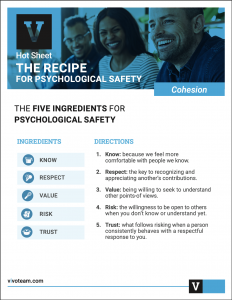Psychological safety—the shared belief that it’s safe to take interpersonal risks as a group—fosters healthy team dynamics and interpersonal relationships. This can have a positive effect on high-quality decision making, innovation, and ultimately lead to highly-functioning leaders and teams.
A voluntary, participatory team sport, psychological safety is a two-way decision:
- A personal decision about whether to “risk it” or not is made based on one’s own personal history/experience.
- How people are behaving on a team will either promote or obstruct a sense of psychological safety on a team.
If someone on your team thinks it’s not safe to speak up, they will not feel safe in the group, regardless of what the group is doing. This can lead to missteps or mistakes that may not have occurred if they did feel safe to speak up in the first place!
Like baking, psychological safety requires a specific recipe for it to rise:
- Know: because we feel more comfortable with people we know.
- Respect: the key to recognizing and appreciating another’s contributions.
- Value: being willing to seek to understand other points-of views.
- Risk: the willingness to be open to others when you don’t know or understand yet.
- Trust: what follows risking when a person consistently behaves with a respectful response to you.
Now, take a moment to consider the following:
- What’s one behavior that positively impacts your sense of psychological safety?
- What’s one behavior that negatively impacts your sense of psychological safety?
So, how can you build psychological safety on your team? Let’s start with you!
Self-awareness is the ability to recognize what you are feeling, understanding your emotional responses to events, and recognizing how your emotions affect your behaviors.
- Try building self-awareness on your team by first recognizing, and then sharing, how you best like to work or communicate, and even how you like to be recognized. Encourage your team members to do the same.
- Being able to manage your behaviors is essential to taking responsibility for your actions, and it can save you from hasty decisions that you later regret. We call this self-management, where the goal is to respond to people so that both parties “win”.
How you respond to people is a choice. Try to avoid knee jerk reactions, even by taking a pause or walking away. Delaying your reactions can increase the probability of a productive conversation where you actively listen and the other party feels heard—a win-win!
You’re not going to increase your psychological safety overnight, and self-awareness and self-management can be tough nuts to crack. But, being aware of them and knowing they are an important part of workplace wellness is a great start!
.png?width=125&height=61&name=Logo%20-%20Vivo%20Team%20-%20White%20(2).png)


